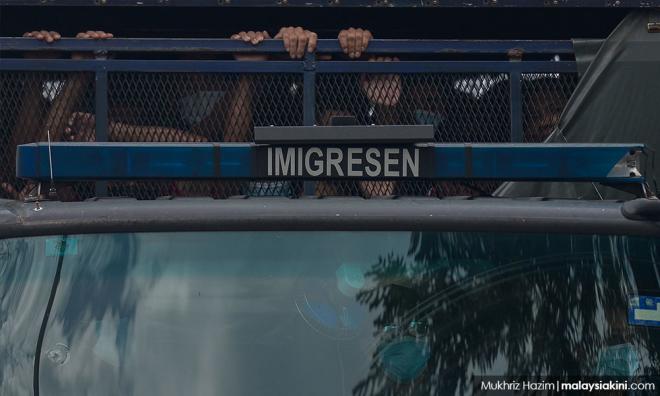LETTER | I refer to the media statement by the director-general of Immigration, dated June 9, 2020, where reference is made to a Facebook posting by one Heidy Quah, which makes serious allegations about the deplorable conditions in an immigration detention centre.
The Facebook posting does indeed make some serious allegations. For example, it mentions a woman with a newborn baby in detention who did not have sanitary pads, as a result of which her pants were soaking wet with blood.
The baby did not have nappies and had to make do with an old T-shirt. The mother was in handcuffs all the time when she had a visitor who had brought her some food. The price of the food in the canteen was exorbitant, such as RM12 for a cup of noodles, etc.
It is commendable that the DG of Immigration is taking these allegations seriously because, as we all know, the detainees are not criminals but mostly those who had committed administrative offences such as overstaying their visas or working without valid work permits.
As such, the conditions in the detention centres are not punitive and there are strict protocols on how they should be treated and the kind of food they should be provided. The director-general of Immigration has clarified that there is an allocation of RM12.50 per day for food, which would ensure that the detainees have decent, balanced meals each day.
It was also clarified that there are separate living accommodations for women with small children (though infants and children should not be in detention centres). The women and infants are provided with all necessities such as milk, nappies and sanitary pads. It is strange, therefore, that in the Facebook posting, Quah says that she had received urgent requests for her to provide milk and diapers.
It must be noted that critical reports about conditions in Immigration Department detention centres are not new and If they are allowed to continue unchallenged, they will do a great disservice to the department and also portray our country in very poor light internationally.

Even as far back as in 1995, the then executive director of Tenaganita, Irene Fernandez, published a report on the conditions in Immigration Department detention camps, titled "Abuse, Torture and Dehumanised Conditions of Migrant Workers in Detention Centres".
The report was stoutly opposed by the government and Irene was promptly charged under the Printing Presses and Publications Act for maliciously publishing false news. Such a strong response fro the Immigration Department would perhaps discourage irresponsible persons from making unfounded allegations about conditions in immigration detention centres.
However, Irene was finally acquitted of the charge by the High Court in 2008, which may have been unfortunate for the Immigration Department because reports of gross violations of human rights in immigration detention centres keep recurring from time to time.
As a way forward and in order to dispel any lingering doubts about the conditions in immigration detention centres, the director-general of Immigration could take the following actions:
1. Ask the Human Rights Commission of Malaysia (Suhakam) to immediately release the report of its inquiry into the conditions in Immigration Department detention facilites, which Suhakam conducted recently;
2. Appoint an independent Board of Visitors, including a fair representation from NGOs involved in work with migrants and refugees, that would be tasked to make regular, independent visits to all Immigration detention centres where they would be provided facilities to meet and speak with detainees without the supervision of the authorities;
3. Provide detainees with the facilities to make regular, uncensored telephone calls to family, friends and their diplomatic missions; and
4. Provide detainees with the facilities to write and send uncensored letters.
I am sure that the DG Immigration would have no objections to these suggestions, since the detention centres are very well managed and, in fact, reflect well on his performance.
When measures such as those suggested are in place, and information on the conditions in detention centres is freely available, it will be much easier for the director-general of Immigration to refute irresponsible and baseless allegations about the way in which the detention centres are managed.
JOSEPH PAUL is a member of the human rights organisation Tenaganita.
The views expressed here are those of the author/contributor and do not necessarily represent the views of Malaysiakini.

